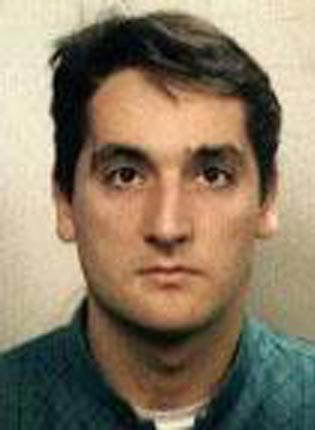Eta's terrorist chief captured in cottage as he plans his next plot
French police swoop on man wanted for bomb plot on King at Guggenheim

Your support helps us to tell the story
From reproductive rights to climate change to Big Tech, The Independent is on the ground when the story is developing. Whether it's investigating the financials of Elon Musk's pro-Trump PAC or producing our latest documentary, 'The A Word', which shines a light on the American women fighting for reproductive rights, we know how important it is to parse out the facts from the messaging.
At such a critical moment in US history, we need reporters on the ground. Your donation allows us to keep sending journalists to speak to both sides of the story.
The Independent is trusted by Americans across the entire political spectrum. And unlike many other quality news outlets, we choose not to lock Americans out of our reporting and analysis with paywalls. We believe quality journalism should be available to everyone, paid for by those who can afford it.
Your support makes all the difference.Police swooped on the leader of the armed Basque separatists Eta yesterday and arrested him at a cottage in northern France, the latest blow to a group weakened by dozens of recent arrests.
Ibon Gogeascoechea was captured just as he was giving "final orders" to high-level operatives before they entered Spain "with the worst of intentions", said the Spanish Interior Minister, Alfredo Perez Rubalcaba.
The 54-year-old Eta chief has been wanted since 1997, when he allegedly placed explosives around the Guggenheim museum in Bilbao before the inaugural visit by the Spanish King.
For an entire week, French and Spanish authorities followed Mr Gogeascoechea's movements inside a cottage rented with false documents in the small French town of Cahan, in Normandy. He had planned to leave on Sunday, when police moved in.
Police also arrested his cottage companions, Beinat Aguiagalde and Gregorio Jimenez, who were receiving a "good-bye". They are considered especially dangerous; Mr Aguiagalde is accused of killing a Basque regional politician and a businessman in 2008. and Mr Jimenez, reportedly a veteran logistics expert, is wanted in connection with a foiled attack on the former prime minister, Jose Maria Aznar.
During the raid, police found explosives, a stolen car that had been falsely registered in France, documents, computer equipment and a pair of shackles, presumably to be used in kidnappings.
Mr Gogeascoechea is the fifth significant Eta leader arrested in less than two years, thanks in part to improved co-operation between investigators in Spain, France and Portugal. In the past two months, police have arrested 32 operatives, dismantled a logistics base in Portugal and truncated plans to set up another base in Catalonia. They also confiscated 2,000kg of explosives and other equipment.
"These have been the worst two months in Eta's history," said Mr Rubalcaba. "Eta is up to its business as usual, that is, attacking seriously, and if it hasn't done so it's because of the efficiency of security forces."
Eta's latest fatal attack killed two Civil Guard officers on the island of Majorca in July. The bomb, which went off 500m from a crowded beach, also injured several civilians and caused holiday traffic chaos.
The separatist organisation has killed more than 800 people in its four-decade fight for an independent Basque homeland in northern Spain and southwestern France. It is listed as a terrorist organisation in the EU and the US. The group usually targets politicians, police and Basque businessmen.
Spain's socialist Prime Minister, Jose Luis Rodriguez Zapatero, had attempted to negotiate a peaceful dissolution of the band when it declared a "permanent ceasefire" in 2006. But talks ended nine months later after Eta planted a bomb in Madrid's Barajas airport, killing two people.
Since then, the group has become increasingly isolated politically. Court decisions have repeatedly thwarted attempts by Eta's political wing, Batasuna (and its various incarnations), to stand for elections. In a 2009 vote, the non-violent Basque Nationalist Party lost control of the regional government for the first time in three decades. Earlier this month, members of Eta's political wing reportedly called on the band to give up terror. But that doesn't mean an end to violence is expected anytime soon. As Eta's political wing loses ground, its military apparatus grows more powerful within the organisation's leadership, according to the Interior Minister. "Now the guns are the ones in charge," he said.
The Spanish Association of Terrorism Victims applauded yesterday's arrests but advised caution. "Eta continues preparing to murder," the association said in a statement. "It does not have, or has ever had, the intention of putting down its arms."
Join our commenting forum
Join thought-provoking conversations, follow other Independent readers and see their replies
Comments